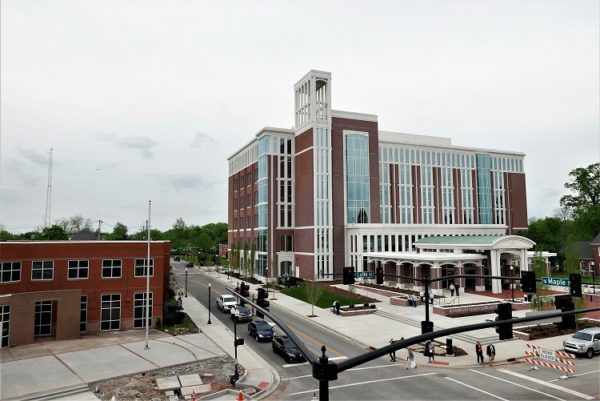
Craig Tindall / photo courtesy of WGNS Radio
Word on the street in December 2017 was that the Murfreesboro City Council would give Rob Lyons the boot as city manager and replace him with City Attorney Craig Tindall—at least temporarily.
Sometimes it takes things longer than expected to come to fruition—about six months in this case.
It’s also pretty unusual for a city attorney to apply for a city manager job. It’s never happened here, though some people would contend city attorneys and county attorneys, for that matter, have been running the show in Rutherford County for years.
But council members were almost irate with a consulting firm’s handling of a national search, as well as the candidates it turned up. The firm apparently didn’t bother providing any interviews of the 10 finalists, none of whom overwhelmed the council anyway. Thus, they had very little to go on, and basically the crap hit the fan.
So it wasn’t surprising to see City Councilman Eddie Smotherman nominate Tindall for the post, based on the failed national search and considering what was being said in late December when Lyons was on the hot seat.

Eddie Smotherman / photo by Frank Caperton
Smotherman, in fact, acknowledges he wanted Tindall to take the job as interim city manager last year, giving the council an opportunity to see him on the job before it would have to vote whether to retain him or not.
Instead, the council made Jim Crumley the interim city manager, and now they’re putting all their bets on Tindall. In a letter to the council, he touts his experience as city attorney in Glendale, Arizona, and in Murfreesboro, where he handled ordinances, finances, department communications, etc.

Mayor McFarland / photo courtesy WGNS
Questions have surfaced about whether Tindall had the inside scoop on the job since he advised council members during attorney-client meetings about how to handle the Lyons situation last year. Council members, including Mayor Shane McFarland, are adamant they didn’t talk to Tindall about giving him the job at those private sessions.
Apparently, we’ll have to trust them, which is a scary thought, since those meetings are closed, allowing the city attorney to discuss legal strategy with city officials.
But the proof, ultimately, will be in Tindall’s performance once the council approves the contract for his $180,000 yearly salary, plus $40,000 in benefits.
The questions are many: Will he be able to function in the open, which city managers are largely required to do? Attorneys can keep much of their activity confidential, since it deals with legal advice, although Tindall typically answers questions when asked.
Also, will he be able to help break the city’s habit of spending money like a drunken sailor?
Why did the council go back with Strategic Government Resources for a national search when it failed to produce results in a search for an HR director?
And, why didn’t anyone with major credentials want the city manager’s job? Tindall, after all, could have taken it when the council asked city employees to look at it last December.
Maybe, just maybe, nobody really wants to work for the council. I’d take the $180 grand, plus benefits, but I couldn’t work for them, especially if they handled everything like the hiring of Tindall.
Beautiful but Hated
The early verdict on the $74 million Rutherford County Judicial Complex: It’s pretty, but it sucks.
It has plenty of open space, lots of big courtrooms (no more jostling for elbow room in standing-room-only courts with folks who need a dose of cologne), plenty of discussion tables and a huge montage of pictures depicting the cupola of the Historic County Courthouse.
Compared to the former Judicial Building, it’s a palace, especially the old room where defendants, district attorneys and public defenders handled their business. Seriously, it’s hard to believe nobody caught a disease from those filthy chairs where people sat while waiting to talk to a public defender. Half the time, someone would be sleeping against the wall with slobber hanging out their mouth. They needed drool buckets, not plea agreements.
Anyway, those days are done, and we’re on to better climes.

Rutherford County Judicial Center / photo courtesy of WGNS
But county leaders got attorneys’ dander up when they made them go through a metal detector with the rest of the rabble. And with security considered paramount—bordering on paranoia—they made it harder for court people to do their jobs. They’ve got attorneys running up and down elevators from inmates to courts, and judges are pretty much blocked off from everybody. So much for efficiency and communication.
You might see judges on the bench, or when they walk to lunch. Otherwise, forget about it. The same with their court assistants.
The old General Sessions office was, oddly enough, a pretty cool place to hang out. Besides the staff, attorneys were always in there having orders and other documents signed, and judges were accessible in their offices. No more.
And the plan that stationed a General Sessions Court judge at the county jail to expedite hearings? Apparently, it’s gone with the wind.
At least we don’t have inmates walking down the hallways anymore, though I never saw one of them threaten anybody. And, we’ve been able to put about eight more deputies to work in security at the new building.
Too bad the escalator never seems to work. Oh well, they don’t really need it anyway. It’s about as useful as the overall security plan, which has sealed people off from the public and made communication damn near impossible.
Transit Down the Drain
Dreams of catching a high-speed train in Murfreesboro for the commute to downtown Nashville are gone, dashed by those dratted Davidson County voters. They just didn’t see the sense in spending more than $5 billion (or maybe $9 billion) for buses, light rail lines and a 2-mile downtown tunnel to make getting around Greater Nashville easier.
Instead, it’s going to be status quo. Better get a comfortable ride or one with great gas mileage if you’re driving to Nashville regularly.
Then again, it was going to take many years to build light-rail lines out Nashville’s main corridors, maybe 15 years, and even then they weren’t going to reach the Davidson County line. It would take even longer for Rutherford County and other doughnut counties to build lines to meet those in Nashville.

By the time all this could get done, anyone who voted for it would likely be retired or dead. I’d probably be face down on my laptop with someone peeling my cold, stiff fingers off the keys.
So the idea of catching a tram or train to Nashville, hooking up to WI-Fi and checking email or writing a story—instead of making an hour-and-a-half commute, on a good day—will probably remain that: an idea.
Those who opposed the May 1 referendum in Nashville made lots of great points, the main one being it was too dang expensive for the return. The wiser thing would have been to embark on this 25 years ago, when it was a whole lot cheaper. Then maybe we wouldn’t look at light rail or trams or trains as some sort of mystery.
But even back in the mid-’90s, people got sticker shock when they looked at the price tag, and it’s not getting any cheaper.
Instead, look for the American love affair with the vehicle to continue, at least in Middle Tennessee, and despite talk about autonomous cars ruling the future, will they wreck any less than those maniacs who drive I-24 every day? I doubt it.













